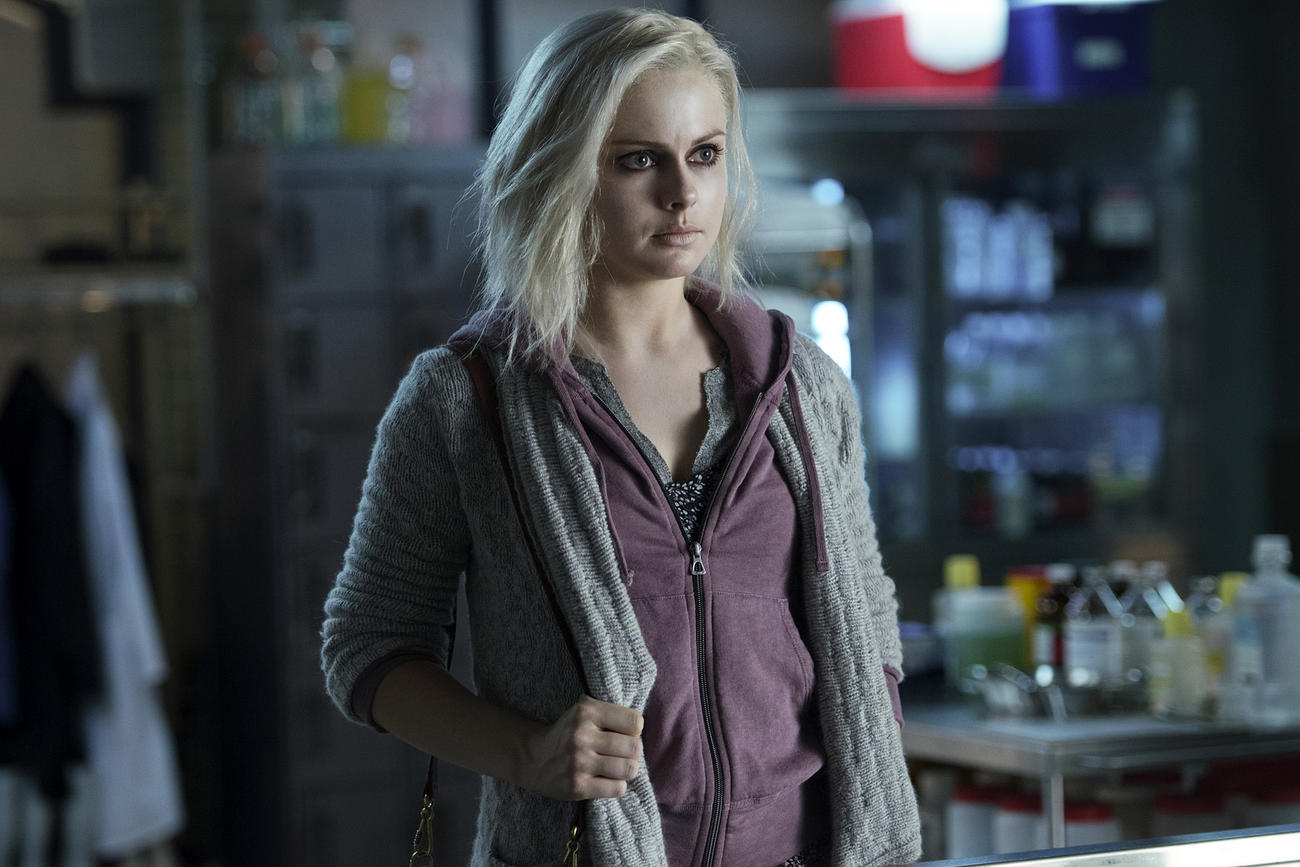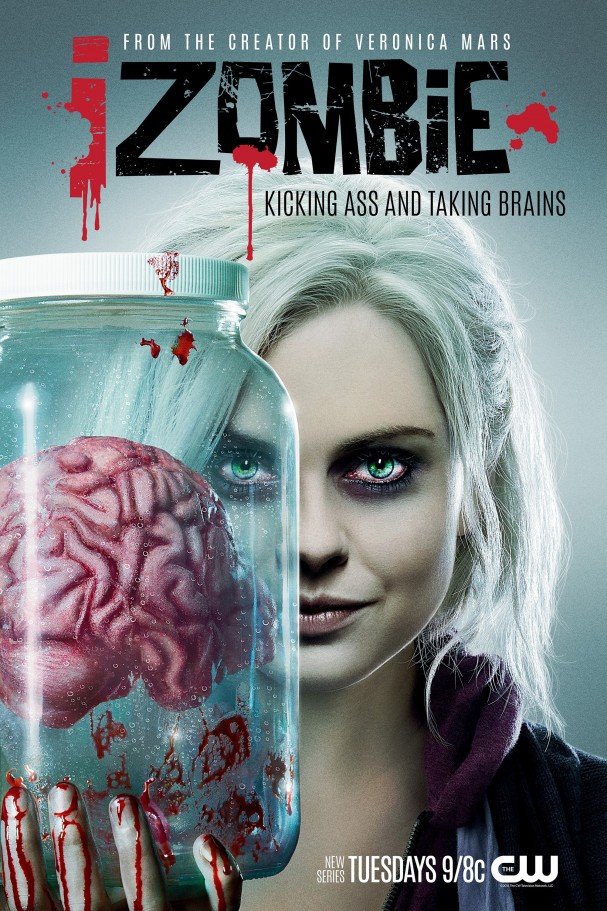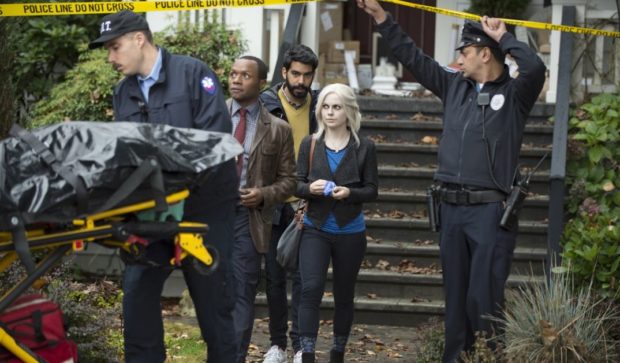Caution: This review may contain minor spoilers for the first season of iZOMBIE.
[stextbox id=”grey” caption=”iZombie (2014-2015)” float=”true” align=”right” width=”200″]
Executive producers: Rob Thomas, Diane Ruggiero-Wright, Dan Etheridge, Danielle Stokdyk
Developed by: Rob Thomas, Diane Ruggiero-Wright
Based on: iZombie by Chris Roberson and Michael Allred (DC/Vertigo)
Starring: Rose McIver, Malcolm Goodwin, Rahul Kohli, Robert Buckley, David Anders
Production Company: DC Entertainment, Primrose Hill Productions, Warner Bros. Television
Distributor: CW
Country: US
Rating: ★★★★¼
(8.5/10)
More info
[/stextbox]
The CW network has seen a string of hits off the back of DC Comics properties, but to date has stuck to some of the more recognisable characters: Superman (Smallville), Green Arrow (Arrow) and The Flash. So it was surprising when iZOMBIE was announced, based on a series from DC Comics’ Vertigo line that ended in 2012. The Eisner nominated run from writer Chris Roberson and artist Michael Allred was a fan favourite, with a high concept that was made for television, so right off the bat the series won points for not following the traditional path of capes and abdominals.
iZOMBIE takes the original comic book and gives it a definite Veronica Mars spin. This is unsurprising given that the driving forces of the series are Rob Thomas and Diane Ruggiero, the producers of that cult show. The basic premise remains the same: Olivia “Liv” Moore (Rose McIver) is turned into a zombie after attending a party. Once a promising medical student, she now works as a morgue attendant to get easy access to brains. Needing them to stop herself from turning “full zombie,” they also give her the memories and abilities of the deceased. Liv gains a new lease on death when she partners with fellow morgue attendant Ravi (Rahul Kohli) and Seattle PD detective Clive Babinaux (Clive Goodwin), who believes Liv is a psychic, to solve murders using the victim’s own memories.
This series is an absolute breath of fresh air, not an easy task for a show dealing with the overused “undead” theme. Despite a change of name from “Gwen” to Liv, and a location shift within the Pacific North West from Portland to Seattle, the show maintains the comic book feel via an opening sequence designed by Mike Allred, and stylistically similar linking title cards. The TV show drops the other supernatural elements, such as ghost companions and vampires, for a comparatively more straightforward investigative show with an overarching plot about zombie drug baron Blaine DeBeers (David Anders) running a blackmail ring by creating a demand for brains in newly created zombies (especially those he created himself).
Like Veronica Mars, or even Buffy The Vampire Slayer and similar supernatural quirk before it, the main strength of the show is the characters. No stranger to fantasy and sci-fi, Rose McIver’s likeability is central to the success of the show, serving as both its star and narrator. Her mix of initial ennui with firebrand investigator is a tried and true characterisation, but takes the edge off the more gruesome elements (read: brain eating) of the show. Rahul Kohli is a wonderful foil, in on Liv’s secret from the start and providing the more obvious comedic aspects. Goodwin’s no-nonsense cop is the least fleshed out. That’s saying something, especially when token CW shirtless guy Robert Buckley (as Liv’s ex-fiancé) gets a whole mini-narrative that ties in with the main plot.
The mostly solid season comes with few issues, beyond the potential to fall back on the “monster of the week” style storytelling. There’s a conscious effort to differentiate each death, ranging the gamut from the Law & Order esque jilted lover of a painter (“Brother, Can You Spare a Brain?”) to the more ridiculous hitman (“The Exterminator”) or even a skydiving accident (“Flight of the Living Dead”)! Some of these fall back on familiar tropes, with “Virtual Reality Bites” proving that network television will never get sick of incorporating World of Warcraft clones into murder serials. There’s also a rather poorly done episode where Liv gets the brains of a pregnant woman (“Maternity Liv”), and her “fierce maternal instincts” kick in. Apparently being a mother means an inability to function for being patronisingly caring for absolutely everyone around you. Similarly, in “Dead Rat, Live Rat, Brown Rat, White Rat,” the brains of a high school girl turn Liv into a peppy ditz for a time, relating to other teenage girls on For a show that seems to celebrate its strong female lead, it’s a rather confusing message.
iZOMBIE has a first season with a terrific sense of humour, and is one of the few shows that is comforting to watch each week – even with all the blood and gore. It really comes into its own in the back half of the season when the various narratives start converging on the source of the zombie outbreaks, and each of the characters gets a flag to carry right until the final bloody episode, leaving us more than primed for a second season. As the zombie world expands, it is easy to see this building its own rich history and cult following beyond the comic origins. If comic book TV is going to keep being this good, we’re not going to have much time to read the origin material anymore.






